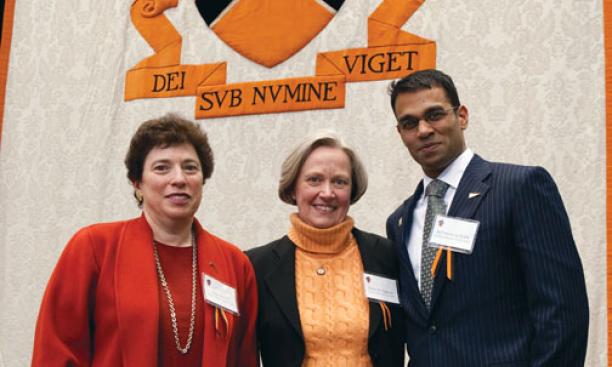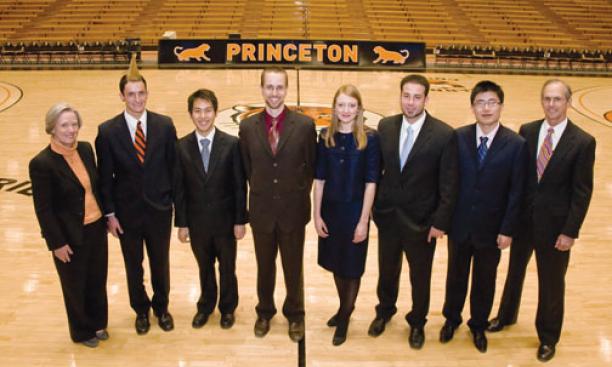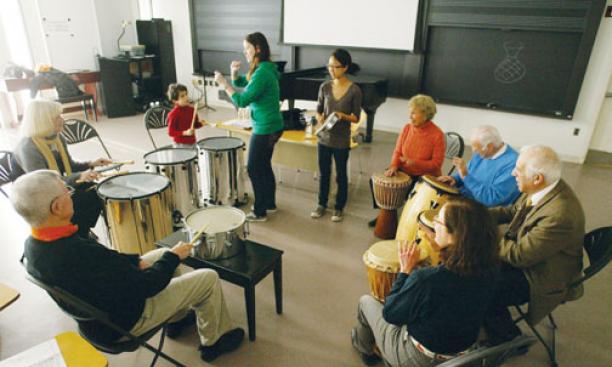

Black holes that can swallow entire galaxies and urban pathologies that can, unless addressed, destroy a generation of underprivileged children formed the heart of Alumni Day talks Feb. 21. Morning lectures by Rajiv Vinnakota ’93, recipient of the Woodrow Wilson Award, and Claire Max *72, recipient of the James Madison Medal, before large crowds in Richardson Auditorium, addressed their transformative work in fields so distant that they must be measured in light-years, and near enough that they can be found in the shadow of the nation’s Capitol. The Wilson and Madison awards are the University’s highest honors for alumni.
About 1,100 alumni and friends attended the traditional luncheon at Jadwin Gymnasium, with the largest ovations going to two sociology majors, Alex Barnard ’09 and Andy Chen ’09, who shared the M. Taylor Pyne Honor Prize and spoke movingly about their commitment to Princeton and the lessons they had learned there.

Robert Murley ’72, co-chairman of the University’s Aspire capital campaign, noted that $980 million has been raised toward the campaign’s $1.75 billion goal. “I think that’s pretty impressive,” he said, adding that “the hill has become a little steeper” because of the nation’s economic problems. While Annual Giving contributions are behind the pace of last year’s record $54 million campaign, Murley said, the University hopes to reach its participation goal of 61 percent.
Vinnakota was honored for his work in establishing the SEED school in Washington, D.C., the nation’s first public urban boarding school. The school, which opened in 1998 and now enrolls 320 students in grades 9 through 12, offers a college-preparatory curriculum and cultural-enrichment activities for disadvantaged children. Its measurable success — 98 percent of SEED graduates go on to college, including Sophia Echavarria ’09 — has led to the establishment of a SEED school in Baltimore. Additional campuses are planned in Milwaukee, Cincinnati, and Newark, N.J. Vinnakota currently heads the SEED Foundation, which oversees the programs. He also is chairman of the Annual Giving Committee and a former University trustee.
In his talk, Vinnakota described how the SEED project grew out of a casual discussion at his first reunion about the lack of boarding-school opportunities for students who are poor. After researching the issue, he quit his job as a management consultant and lived off his savings for 18 months as he developed a plan to attack the problem.
Success was achieved, Vinnakota said, because he was “naive, stubborn, and lucky.” He outlined the many challenges that any social entrepreneur must overcome to bring about change. Anyone starting a nonprofit, Vinnakota said, faces a tension between being a visionary and running a business.
In the morning’s first lecture, Max spoke of black holes and colliding galaxies. Max, a professor of astronomy and astrophysics and director of the Center for Adaptive Optics at the University of California-Santa Cruz, is the first woman to receive the Madison Medal. She was recognized for her work in adaptive optics, which enables earth-based telescopes to see distant objects more clearly by correcting for image distortions produced by the earth’s atmosphere. Telescopes equipped with adaptive-optic technology may even be able to observe what happens when black holes collide in distant parts of the universe.
Adaptive optics may have earthbound applications as well, Max said, enabling scientists to determine the physiology of the human retina, which could make treatments to prevent blindness more effective.
In addition to the two principal lectures, Alumni Day featured other talks and events for returning graduates and parents. These included lectures on energy independence, globalization and the reach of American Christianity, and how bacteria communicate, as well as a session on navigating the college-admission process and guided tours of the new Frank Gehry-designed Lewis Library. The annual Service of Remembrance, held in the University Chapel, honored members of the Princeton community who died during the past year.
At the luncheon, President Tilghman presented the Porter Ogden Jacobus Fellowships to four outstanding graduate students and announced the winners of the Pyne Prize.
Co-recipient Chen, who founded the Student Design Agency, credited Princeton with teaching him to confront and overcome fear. “The gift of the liberal arts,” he said, “is in our capacity for empathy.” He will attend graduate school at Yale in the fall.
Barnard, who shared the award and has served as president and drillmaster of the Princeton University Band, was praised by Tilghman for being “as much a scholar as an activist” and a committed champion of animal rights who wrote his senior thesis on the “freegan” movement, which rejects consumerism and seeks to use recycled goods and even discarded food to limit consumption (see Notebook, March 4, for a profile of Barnard). Selected as this year’s Sachs scholar, he will attend Oxford in the fall.

